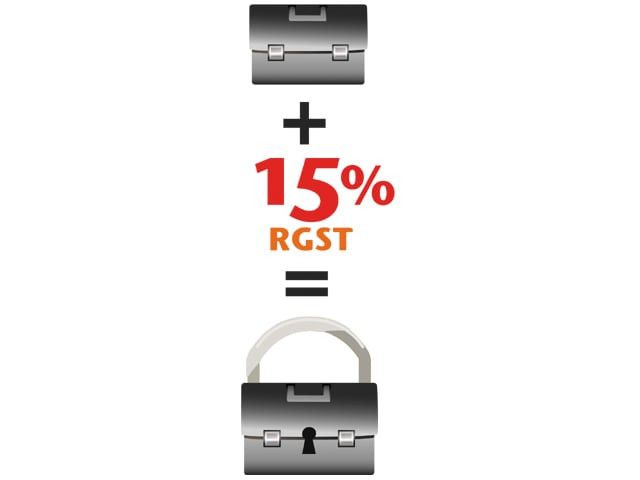No free lunch: The new tax and the issue of documentation
Tax structure must reward, not punish, businesses for disclosure.

No free lunch: The new tax and the issue of documentation
It is argued here that a tax rate of 15 per cent is a certain barrier for small businesses to disclose themselves. Therefore, imposition of the RGST is unlikely to bring new businesses on the register and, in fact, is more likely to reduce overall collections.
Writing in the Hindustan Times, Pramit Pal Chaudhuri recently argued that Pakistani firms are shrinking, avoiding raising capital, moving out of the formal and into the informal sector and otherwise declining to do what you would expect from the private sector.
A bulk of Pakistan’s economy is underground, or ‘extra-legal’. Of the 3.2 million non-agriculture enterprises in the country, most fall under the category of small and medium enterprises (SMEs).
Almost all of these are small firms with less than 10 full-time employees. It is here that the bulk of the extra-legal sector thrives: vendors, suppliers, retailers, wholesalers, manufacturers and the like.
The accounts are multiple, but most would identify the size of the extra-legal economy between 30 and 50 per cent of the overall economy, valued at a minimum of $51 billion.
Furthermore, according to the government’s own estimates, the black economy has continued to grow at nine per cent per annum between 1977 and 2003, wherein the average annual national GDP growth during the same period was less than five per cent.
People do not opt to live in the extra-legal sphere out of a fear to pay taxes – they may end up paying far more since the extra-legal framework is not completely free-of-charge.
Therefore, as Hernando De Soto says, what determines whether “you remain outside is the relative cost of being legal.”
Adapting existing social contracts for business transactions is the key to documentation, not the levy of more taxes. The instances of legal failure – not in the sense of implementation failure – but in terms of failure in evolving laws according to social contracts are many.
The case of remittance transfer presents an interesting example of how the written law is abandoned by the people in favour of a social contract. The hawala or hundi system represents the social contract while the telegraphic transfer method represents the written law.
Somewhere in between, the market has embraced Western Union and many other agencies like it, which are as efficient as hawala, certainly expensive but still less ‘official’ than bank transfers.
Given the administrative loopholes in the tax collection system, the impact of a reformed sales tax on reducing the extra-legal economy is open to debate. This argument applies to all kinds of tax evading businesses: those who are registered and pay less than their share and those who remain out of the tax net altogether.
A study conducted at the Lahore University of Management Sciences claims that out of every Rs100 paid, Rs62 are pocketed back by the tax payer, collector and practitioner.
The Federal Board of Revenue (FBR) faces the herculean task of expanding the tax base. For this, it must start with helping the millions of small enterprises which are ready to pay taxes to avail the benefits of documentation, such as access to formal credit.
A sales tax of 15 per cent is simply too high to induce these businesses to disclose themselves. An ideal tax rate will be much lower but its exact calculation should be best left to detailed economic research.
A tax structure must reward, not punish, businesses for disclosure.
The author, an economic consultant, is Director Programme and Development at the Alternate Solutions Institute, Lahore. He can be contacted at ali@asinstitute.org
Published in The Express Tribune, December 6th, 2010.



















COMMENTS
Comments are moderated and generally will be posted if they are on-topic and not abusive.
For more information, please see our Comments FAQ